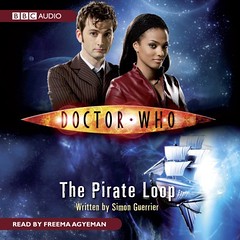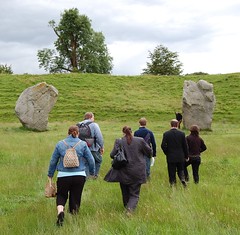M. rather marvellously smuggled me into the IMAX last night for a press screening of
The Dark Knight. It's a huge, 2.5 hour epic full of thrill and excitement, and six whole scenes of especially IMAX-tastic hugeness. Golly.
Long-toothed readers of this blog may recall
my review of Batman Begins for Film Focus, where I dared suggest the general cool marvellousness was a little dulled by the lack of good roles for women. Rachel, now played by Maggie Gyllenhaal rather than Mrs Tom Cruise, seems to agree. She's now shacking up with Harvey Dent, the cool district attorney and white knight to the city – a man who's everything Bruce/Bats can't be.
But Harvey doesn't just want Bruce's girl, he also wants in on Batman's crusade to bring down the Gotham mob. The mob, led by my old mate Eric Roberts (well,
I met him once), is a bit cheesed off by all this and then find themselves being made an offer they can't refuse by a kray-zee new kid called the Joker.
The
late Heath Ledger's performance has been the focus for a lot of reviews so far, and it's an eye-popping, compelling and terrifying thing. Yes, Ledger should get an Oscar nomination, but then Nicholson should have had one for the same role 19 years ago. To my delight, there's no (single) explanation for where the Joker comes from here or what unhinged him. He's all the more appalling for not being explained. While Bats and Bruce and all their good-guy pals wrangle over how and when they can bend their own rules, Joker's an anarchic live-wire just in it for the explosions. The violence comes without warning; it's a shocking, brutal film and not all the regulars will be back for the third one.
As I argued with the first one, comic-book movies are all about reshuffling the established genre rules and conventions so that they come out looking new. The Dark Knight is a lot more complex, rich and full of strange moral ideas than it has really any need to be, which give the huge-scale set pieces and fast-cut fighting that much more of an edge.
It's still relentlessly male. There's really only two women in it besides Rachel: Jim Gordon's colleague Ramirez and his wife Barbara. And, I'd argue, both are there because of what they add to Jim, rather than having roles and motives of their own.
Yet it's notable that our regulars are faced with these reflections; their motives and behaviour is constantly being questioned by all sides. This doesn't bolster one particular viewpoint that comes with all the answers (as in
Socratic dialogue) as to continually muddy the water. The film has plenty to say about vigilantes and civil liberties, but from lots of different voices. Batman and the goodies give their best to the cause, but the question hanging over them through it whether that best is good enough.
Batman Begins seemed to be riffing of stuff in old comics
Year One and
The Long Halloween. This nicks elements from
The Dark Knight Returns and, I'd argue,
The Killing Joke. Spider-Man has already done the hero as emblematic of the city at large, an inspiration to ever more kray-zee super-villains and yet also to the noble instincts of the city's people. There's a nice prisoner's dilemma late on in this (which I won't spoil here) that hangs on how Joker – and Batman – expect people to behave.
It reminded me of
Midnight in that it's not just the predicament that's so horrifying but how characters react to it. The result, though, felt a bit too plot convenient rather than earned: two characters respond in way that's surprising
because it's not consistent with what little we know about them...
That makes it sound like a criticism, but it's less a niggle as it having been swimming round my feeble brain all day. While I'm meant to be writing my own set-piece action adventure I'm tonguing the sore-tooth of the film's “message”. I'm not sure it has one. Does Batman win at the end? Are things any better for his having been involved? How thrilling, innovative and bold that such a mainstream movie doesn't seem to know...













